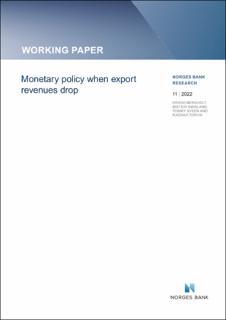Monetary policy when export revenues drop
Working paper
Published version
Permanent lenke
https://hdl.handle.net/11250/3036133Utgivelsesdato
2022Metadata
Vis full innførselSamlinger
Sammendrag
We study how monetary policy should respond to shocks which permanently alter the steady state structure of the economy. In such a case monetary policy affects not only the short run misallocations due to nominal rigidities, but also relative prices which stimulate reallocation of capital. We consider a permanent and negative shock to export revenues that requires a larger traded sector and a smaller non-traded sector in the new steady state. This reallocation calls for a change in relative prices during the transition, but may also lead to a period of high unemployment. We show how an appropriate monetary policy could mitigate the welfare costs of the transition by allowing the exchange rate to depreciate, and thereby allowing inflation to increase in the short run. Traditional monetary policy regimes, such as inflation targeting or a fixed exchange rate, would imply high unemployment and inefficiently slow transition. Stabilizing nominal wage growth, in contrast, would be close to the welfare-optimal monetary policy.

